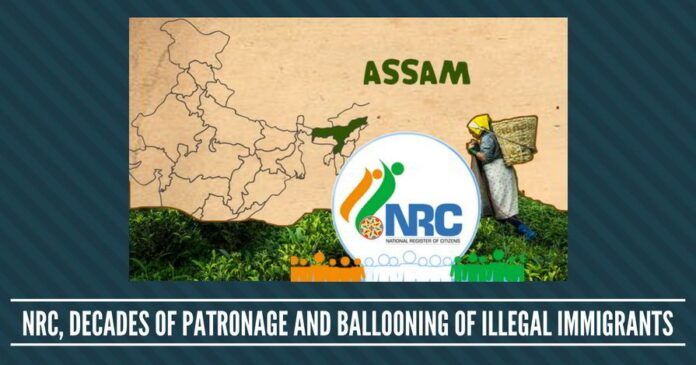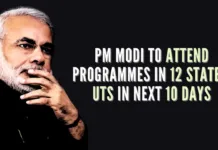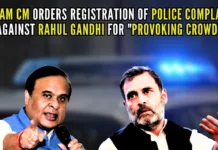
The worst fears of Assam were to come true, largely because of the lack of political action against the illegal immigration of Bangladeshis into India.
The fiery debates over the preparation of a National Register of Citizens (NRC) for Assam have subsided, but it will revive once the final list is ready and made known to the public a few months from now. When the last draft NRC was announced, its critics had made several accusations against the intent of the Government, both the BJP-led one in the State and at the Centre. It was alleged that they had indulged in selectiveness to keep out members of a certain community. One Chief Minister said that Bengali-speaking people in Assam had been targeted and excluded from the list. Questions invoking humanitarianism were also raised. In the din that ensued, not enough attention was paid to the fact that the long and violent period of insurgency which the State had faced, had its roots in the influx of illegal migrants from Bangladesh.
“Militancy started in Assam in the late seventies in the wake of the students’ movement against the influx of Bangladeshis.”
Had there been a political will to tackle this grave issue decades ago, perhaps Assam would have been spared of the bloody conflict. And, while insurgency has thankfully been contained over the years, the threat from certain quarters still remains — a fraction of the United Liberation Front of Assam (ULFA) remains at war with the Indian state. In other words, infiltration of people, their illegal settlement in Assam, and the Government benefits these immigrants have enjoyed over the decades (often at the cost of genuine Indians) have created a crisis of which we have still to see a complete end.
There have been many academics and authors who have written on the issue, Sanjoy Hazarika being foremost among them. But from the political and governance perspective, there would be few books more relevant to the matter than Lt General SK Sinha’s Guarding India’s Integrity. It was published in 2009. Lt General Sinha served as the Governor of Assam for six years from mid-1997 on, and he had assumed office at a particularly challenging time because the State was then in the grip of a civil war — militancy was at its peak and many previous political efforts had failed to make a positive impact. While the book was not just about Assam — the author also gave a detailed account of his tenure as Governor of another troubled State, Jammu & Kashmir, for five years beginning in 2003 — his observations and experiences in the north-eastern State are reminders to us in the present context that we must rise above politics and understand the dangers that illegal immigration of Bangladeshis has posed to not just Assam or the rest of the North-East, but to India as well.
Lt General Sinha wrote: “Militancy started in Assam in the late seventies in the wake of the students’ movement against the influx of Bangladeshis.” He was then the Vice-Chief of the Indian Army. He recollected the trouble that broke out in mid-1979 when, during the process of updating the electoral rolls for the Mangladoi constituency, as many as 70,000 complaints were registered against illegal immigrants with the relevant tribunal; and 45,000 of these were upheld. This added fuel to the anti-foreigners’ movement. The situation worsened when two “Muslim Ministers of the Assam Government… resigned in protest against the deletion of the names of illegal migrants”. This should make it clear as daylight that vote-bank politics then was as rampant as it is now, with vested interests trying to protect the infiltrators.
There are now several districts in Assam where the demographic change has been so dramatic that the majority community of decades has become a minority one.
Only recently, former Assam Chief Minister Tarun Gogoi remarked that the large increase in the State’s population (particularly among the largest minority community) was due to widespread illiteracy and that it had less to do with immigration. How ridiculous this assertion is, can be understood from the fact that Lt General Sinha had pointed out in his book, that then Chief Election Commissioner SL Shakdhar had addressed a Press conference and noted the population increase — an increase in 1971 by as much as 34.98 percent over the 1961 figures — was because of infiltration. Shakdhar observed: “The influx has become a regular feature.” He went on to sound a grim warning, “I think it may not be a wrong assessment to make, on the basis of the increase of 34.98 percent between the two Censuses, that the increase that is likely to be recorded in the 1991 Census would be more than 100 percent over the 1961 Census.” And, if this warning was not terrifying enough, the Chief Election Commissioner added, “In other words, a stage would reach when the State will have to reckon with the foreign nationals who may probably constitute a sizeable percentage, if not the majority of the population…”
The worst fears were to come true, largely because of the lack of political action against the phenomenon of illegal immigration of Bangladeshis into India, and their settlement across the country, but primarily in the east and the North-East. There are now several districts in Assam where the demographic change has been so dramatic that the majority community of decades has become a minority one. Shakdhar had also, as Lt General Sinha quoted in his book, expressed worry over the political patronage. The then Chief Election Commissioner had said: “Another disturbing factor in this regard is the demand made by the political parties for the inclusion in the electoral rolls of the names of such migrants who are not Indian citizens, without even questioning and properly determining their citizenship status.” It requires no great intelligence to understand which the political parties were, that backed the infiltrators in lieu of votes.
It is precisely to end this dangerous patronage that the NRC is being prepared at the behest and under the supervision of the Supreme Court. Had the previous State and Central Government taken the issue seriously — Lt General Sinha had submitted a detailed account of the subject of illegal immigration in Assam to the President of India — a great many tragedies could have been avoided.
Note:
1. The views expressed here are those of the author and do not necessarily represent or reflect the views of PGurus.











Leaders? OR? PARASITES?? BIGGER INTERESTS OF MAJORITY ALWAYS SACRIFICED? WHAT KIND OF OF DEMOCRACY THE PAST PARTY MEN IN COMMAND LEARNT? VOTERS !IF YOU DO NOT TAKE LESSON FROM PAST AND BOYCOTT ALL PAST MISCHIEF MONGERS IN NEXT ELECTION YOUR LIVING WILL BE IN DANGER!